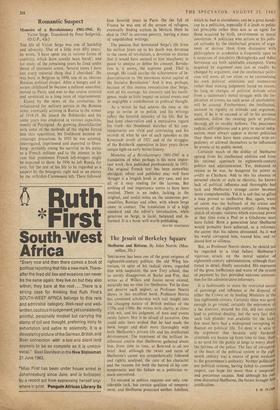Romantic Suspect
THE life of Victor Serge was one of hardship and adversity. 'Out of a little over fifty years,' he wrote, 'I have spent ten in various forms of captivity, which have usually been harsh'; and for many of the remaining years he lived under threat of imminent arrest. Several times I have lost every material thing that 1 cherished.' He was born in Belgium in 1890, son of an obscure Russian political emigre'. After a hungry and in- secure childhood he became a militant anarchist; moved to Paris; and was in due course arrested and sentenced to a long term of imprisonment.
Elated by the news of the revolution, he volunteered for military service in the Russian army, eventually arriving in Russia in the winter of 1918-19. He joined the Bolsheviks and for some years was employed in various capacities,, mostly in Petrograd. As growing dissatisfaction with some of the methods of the regime forced him into opposition, his livelihood became in- creasingly precarious. In 1933 he was arrested, interrogated, imprisoned and deported to Oren- burg—probably owing his survival to his status as a French militant and to the interest in his case that prominent French left-wingers might be expected to show. In 1936 he left Russia for ever, for the rest of his life to be regarded as a suspect by the bourgeois right and as an enemy by the orthodox Communist left. There followed four feverish years in Paris. On the fall of France he was one of the stream of refugees, eventually finding asylum in Mexico. Here he died in 1947 in extreme poverty, leaving a mass of unpublished writings.
The passion that dominated Serge's life from his earliest years up to his death was devotion to the cause of revolution, a devotion so intense that it would have seemed to him blasphemy to pause to analyse or define his concept. Revolu- tion is, it seems, the supreme good. That is enough. He could ascribe the achievement of in- dustrialisation to 'the enormous moral capital of the Socialist Revolution.' And it was, perhaps, because of this intense romanticism that Serge, with all his courage, his sincerity and his intelli- gence, made so little impact on actual events and so negligible a contribution to political thought.
As a writer he had seldom the time or the urge to revise or to polish, and his writings reflect the feverish intensity of his life. But he had keen observation and a meticulous regard for truth—his thumbnail sketches of his con- temporaries are vivid and convincing and his records of what he saw of such episodes as the Kronstadt revolt of 1921 and of the struggles of the Bolshevik opposition in later years throw unique light on early Soviet history.
Memoirs of a Revolutionary 1901-1941 is a translation of what perhaps is his most impor- tant work, first published posthumously in 1951. The original French text has been somewhat abridged; editor and publisher may well have thought it a longish book in any case, and not all of it easy reading for the layman. But nothing of real importance seems to have been omitted. There is an index, lacking in the original, and useful notes on the numerous per- sonalities, Russian and other, with whom Serge came in contact. The translation is of a high standard and the editor's introduction, while generous to Serge, is lucid, balanced and in- formed. It is a book well worth publishing.
DAVID FOOTMAN






























 Previous page
Previous page